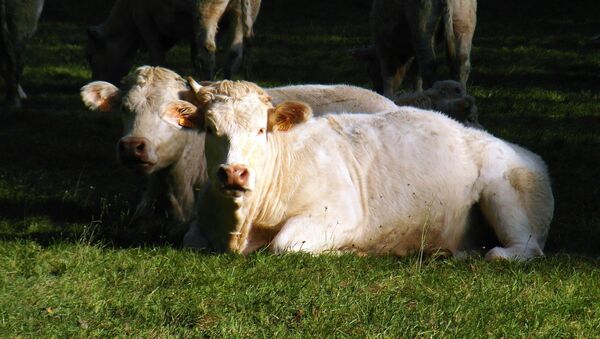The amount of the greenhouse gas methane emitted by individual cows is governed by genetic factors, a joint research project conducted by Aarhus University, the Technical University of Denmark and Viking Genetics has concluded.
In Denmark alone, cow burps account for at least six percent of the country's total greenhouse effect and 40 percent of the country's entire agricultural sector's contribution, Danish Radio reported. According to the researchers, more "climate-friendly" dairy cows could be bred using sperm from Danish bulls to offset the adverse effect in the future.
"Although five percent probably doesn't sound like much, the effect will become stronger over the years. Eventually it will really make a difference," Løvendahl ventured.
According to Løvendahl, it would take up to five years to produce a new breed from "climate-friendly" Danish bull sperm.
Furthermore, the potential benefits of this method are claimed to go far beyond Denmark's borders. Should the technology become recognized as an environment-friendly measure in the future, markets in Asia, South America and Africa could become interested, according to Viking Genetics project leader Jan Lassen.
Cows in the shed. Power from the roof and slurry and farm yard manure going to biogas plant. Denmark. #nuffieldag pic.twitter.com/lGm8pp4WKQ
— Ed Payne (@grazyfarmer) May 31, 2017
"We would be able to reduce their methane emissions by 15 to 20 percent more than here in Denmark, since we already have low methane emission levels for cows," Lassen said.
Denmark is no novice in reducing the humble cow's carbon footprint. In 2016, the same Aarhus University developed a new type of environmentally sound grass more palatable for cattle's digestive tract, one of the main culprits when it comes to releasing climate gases. With support from the Danish Environment and Food Ministry, which allocated DKK 13.5 million (over $2 million) for further research of the bovine metabolism, the gas-free grass may be introduced in just a few years.
READ MORE: Eco-Minded Danes Develop New Grass to Reduce Cow Burps
Cow burps have been found to be about 25 times more potent than carbon dioxide in terms of warming our planet, and a single cow produces up to 500 liters of methane a day. The Nordic country alone is home to some 565,000 cows, according to the AHDB Dairy website.
Organic Procross cow in Denmark. 300 cows averaging 10900kg at 5.1% fat and 3.9% protein!! pic.twitter.com/h1t9L1DUmt
— Bovi-gen (@bovi_gen) May 19, 2017



